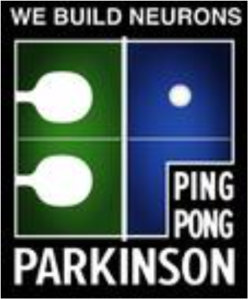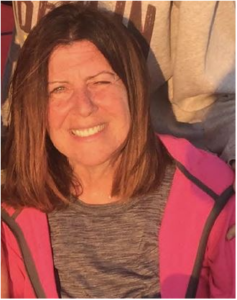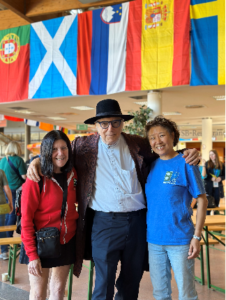An interview with Jan Rose & PingPongParkinson founder Nenad Bach: Thriving with Parkinson’s on October 24, 2023 by George Ackerman, Ph.D, J.D.

Biography. Please tell me a little about your background.

Founder Nenad Bach
Nenad Bach is a Croatian-American musician, rock star, and activist who has performed with a wide range of famous musicians including Bono, Luciano Pavarotti, Paul McCartney, and Bruce Springsteen. In 2010, Nenad was diagnosed with Parkinson’s disease, and lost the ability to play guitar. He experienced increasingly debilitating physical and cognitive impairments, until through a chance encounter playing ping pong at the invitation of a friend, Nenad felt a surge in health. Encouraged, he continued to play ping pong. The impact of ping pong on his health was so significant that Nenad organized a local program where he lived in Westchester, NY for other people living with Parkinson’s. Since its founding in 2017, Nenad’s nonprofit has become a global entity, encompassing local chapters in 22 countries around the world.

Jan Rose
I am the Chief People Officer for Henry Street Settlement, a nonprofit provider of social services, arts, and health care programs for Lower East Side residents and other New Yorkers. I have more than 25 years of experience strengthening organizational effectiveness in nonprofit and for-profit settings. Since I was diagnosed with Parkinson’s Disease in 2020, I founded the New York City chapter of PingPongParkinson, where I lead ping pong sessions, educational programs, and social events for people living with the disease. I also volunteer with my certified therapy dog visiting patients and the elderly. I have a B.A. Economics and M.B.A. in Industrial Relations from McGill University in Montreal, Canada. I have two daughters and two grandchildren living in Connecticut and Boston.
Can you tell me more about your organization?
We are PingPongParkinson® , a global 501(c)3 non-profit organization headquartered in Westchester, NY. Our mission is to create a sports movement for people with a Parkinson’s diagnosis offering ping pong as physical therapy. We are the first and only world championship organizers dedicated to raising awareness of the benefits of playing ping pong for the Parkinson’s community.

What is your passion and how did you get involved in Parkinson’s awareness and hope for a cure?
I feel like all the paths of my life have converged to prepare me for this role helping people living with Parkinson’s live a long and joyous life. My career in global human resources was focused on nonprofits delivering social services for impoverished and other marginalized people. When I was diagnosed with Parkinson’s in 2020, I suddenly became one of these people. I heard about a group of people who played ping pong as part of a therapy regime for Parkinson’s in Westchester, and when I joined a few sessions, I fell in love with the sport and the program. I learned the science behind why I felt so good — Our model is based on the concept of neuroplasticity – the brain’s capacity to make new neurons and connections through challenging physical exercise.
What type of goals do individuals with Parkinson’s have when working with you?
Our participants expect their consistent investment in playing ping pong will delay the progression of Parkinson’s symptoms, such as tremors, balance issues, and freezing of movement. This is supported by published research on the benefit of exercise in neurological disease management.
What type of training and how long are the programs?
No one who comes to a PingPongParkinson session is expected to have any skill in ping pong. We provide coaches who show people how to hold a racket and hit the ball with good form, and we are fortunate to offer expert volunteers to come to our sessions to hit balls with participants so that they may practice.
In New York City, the sessions are two hours. We currently offer midday or afternoon sessions on Mondays, Tuesdays, Thursdays, and Fridays, and Friday nights. During the most heavily attended session on Thursday, the program includes warm-up drills, social ice breakers, skill-building presentations, practice and/or games.
What effect can it have on an individual with Parkinson’s?
Our participants expect their consistent investment in playing ping pong will delay the progression of Parkinson’s symptoms, such as tremors, balance issues, and freezing of movement. This is supported by published research on the benefit of exercise in neurological disease management.
Personally, when I play ping pong, I feel the same surge in health (energy, elimination of my constant nausea, disappearance of tremors) that I feel when I take a dopamine pill, which is the medication that most of us have been prescribed.
What would you like to see as a future goal for your programs?
In the seven years of our program’s existence, we have focused on the quality of life of those of us with Parkinson’s: relief of symptoms, enjoyment of athletics and friendly competition, social connections, and the delay of progression of symptoms. Recently, we have begun to introduce lecture series, partnering for example with Mount Sinai Hospital and University of Manchester, UK.
Our future goal is a bold statement – – to find a cure by 2027, using our extensive network to raise awareness and funding for research.
What events do you participate in?
Personally, I attend/lead weekly ping pong sessions 3-4 days a week in New York City and one day a week in Westchester. I compete in PingPongParkinson global championships, most recently in Austria last month. I went to Barcelona this summer to attend the World Parkinson Congress and performed in the opening ceremony as a dancer showcasing Parkinson-focused choreography.
How does this also assist the caregivers?
Caregivers often participate in ping pong sessions along with their partners and clients. It provides an outlet that they can engage in by themselves.
How can someone get in touch? What is your website?
https://www.pingpongparkinson.org/
How can others also become advocates for awareness?
We are all members of a wide circle of groups such spiritual organizations, work, book clubs, gym memberships that would benefit from knowing about this disease and the resources available.
How can we better fundraise to support a cure for Parkinson’s?
Identify/support research that establishes the causal impact of ping pong on the health of people living with Parkinson’s. Make more of an effort to bring PingPongParkinson opportunities to low-income communities and people of color.
What other activities do you undertake to help improve and support your daily living Eg exercise and alternative remedies?
Rock Steady Boxing
Parkinson Dance
Work (maintain cognitive challenge)
Volunteer with my therapy dog at schools and healthcare institutions
Why should people who don’t have Parkinson’s care about this?
10 million people are living with Parkinson’s in the world. We will all eventually know someone or become someone with this disease.
If you had one final statement or quote you could leave for the Parkinson’s community, what would it be?
We will leave no stone unturned to find the cure by 2027! CURE by 2027
–Nenad

